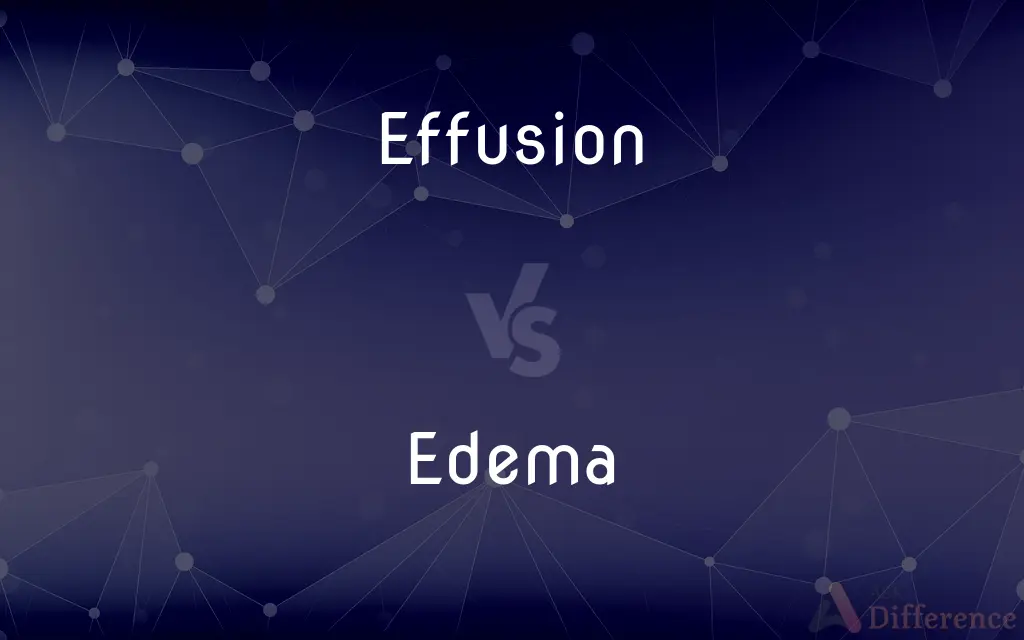Effusion vs. Edema — What's the Difference?
Edited by Tayyaba Rehman — By Urooj Arif — Updated on March 8, 2024
Effusion is the accumulation of fluid in a body cavity, such as the chest or abdomen, often due to inflammation or injury, while edema refers to the swelling caused by excess fluid trapped in the body's tissues, commonly seen in the extremities.

Difference Between Effusion and Edema
Table of Contents
ADVERTISEMENT
Key Differences
Effusion involves fluid buildup within a specific body cavity, leading to potential complications in organ function. This condition can be symptomatic of underlying health issues like heart failure, infections, or trauma, requiring medical evaluation to determine the cause and appropriate treatment. On the other hand, edema manifests as swelling in the body's tissues, particularly in the legs, arms, or face, resulting from various factors including standing or sitting for long periods, high salt intake, kidney dysfunction, and certain medications. It often affects the extremities but can occur anywhere in the body.
While effusion is characterized by the collection of fluid in cavities such as the pleural space (around the lungs) or the peritoneal cavity (in the abdomen), which can significantly impact the functioning of organs like the lungs and heart, edema is typically observed in the subcutaneous tissues under the skin. Edema can lead to discomfort, stiffness, and a range of mobility issues, depending on its severity and location.
The diagnosis of effusion often requires imaging tests such as ultrasounds, X-rays, or CT scans to visualize the fluid accumulation, alongside tests and fluid analysis if needed. Treatment may involve addressing the underlying cause, draining the excess fluid, or medications to manage symptoms. Whereas, diagnosing edema generally involves a physical examination and may include reviewing the patient's medical history, diet, and lifestyle, with treatment focusing on managing the underlying condition, dietary changes, compression therapy, and sometimes diuretics to remove excess fluid.
Effusion and edema, while both involving abnormal fluid accumulation, have distinct mechanisms and implications. Effusion's impact on organ spaces can lead to serious health complications if left untreated, such as respiratory distress or circulatory problems. In contrast, edema, although potentially indicative of serious health issues, often presents more immediate discomfort and mobility challenges rather than direct threats to organ function.
Despite their differences, both conditions signal the body's response to injury, inflammation, or disease, underscoring the importance of medical evaluation and management. Addressing the root causes of effusion and edema is crucial for effective treatment and prevention of further health complications, highlighting the body's intricate balance of fluid regulation and the potential consequences of its disruption.
ADVERTISEMENT
Comparison Chart
Definition
Accumulation of fluid within a body cavity
Swelling caused by fluid trapped in body tissues
Common Locations
Chest, abdomen
Extremities (legs, arms), face
Causes
Inflammation, injury, infections, diseases
Prolonged standing/sitting, high salt intake, kidney dysfunction, medications
Diagnosis
Imaging tests (X-rays, ultrasound), fluid analysis
Physical examination, medical history review
Treatment
Address underlying cause, drain fluid, medications
Manage underlying condition, dietary changes, compression therapy, diuretics
Impact
Can affect organ function and lead to serious complications
Leads to discomfort, stiffness, and mobility issues
Example
Pleural effusion (fluid in the pleural cavity)
Peripheral edema (swelling in the legs or arms)
Compare with Definitions
Effusion
Fluid accumulation in a body cavity, causing potential complications.
An ultrasound revealed a pleural effusion in his chest.
Edema
Swelling from fluid trapped in body tissues.
Her legs developed edema after a long flight.
Effusion
Diagnosed through imaging and fluid analysis.
CT scans helped diagnose the cause of his effusion.
Edema
Diagnosis involves physical examination and history.
The doctor diagnosed edema based on her swollen ankles.
Effusion
Can significantly impact organ function.
The abdominal effusion affected her liver's performance.
Edema
Often affects the extremities, like legs and arms.
Standing all day at work led to peripheral edema in his feet.
Effusion
Often indicates underlying health issues needing treatment.
The effusion was a sign of her advanced heart failure.
Edema
Can result from various health conditions or behaviors.
Her kidney problems caused noticeable edema.
Effusion
Requires medical intervention for resolution.
He underwent a procedure to drain the effusion.
Edema
Managed with lifestyle changes and medication.
She used compression stockings to manage her edema.
Effusion
The effused fluid.
Edema
A similar swelling in plants caused by excessive accumulation of water.
Effusion
In physics and chemistry, effusion is the process in which a gas escapes from a container through a hole of diameter considerably smaller than the mean free path of the molecules. Such a hole is often described as a pinhole and the escape of the gas is due to the pressure difference between the container and the exterior.
Edema
Same as œdema.
Effusion
The act or an instance of effusing.
Edema
Edema, also spelled oedema, and also known as fluid retention, dropsy, hydropsy and swelling, is the build-up of fluid in the body's tissue. Most commonly, the legs or arms are affected.
Effusion
Liquid or other matter poured forth.
Edema
(Medicine)An excessive accumulation of serous fluid in tissue spaces or a body cavity.
Effusion
An unrestrained outpouring of feeling, as in speech or writing
"the devout effusions of sacred eloquence" (Edmund Burke).
Edema
(Botany)A condition of plants characterized by blisterlike swellings on the leaves or other parts, caused by an accumulation of water.
Effusion
A liquid outpouring.
Edema
An excessive accumulation of serum in tissue spaces or a body cavity.
Effusion
Process of gases passing through a hole or holes considerably smaller than the mean free path of the gas molecules.
Edema
Swelling from excessive accumulation of serous fluid in tissue
Effusion
An outpouring of speech or emotion.
Effusion
(medicine) The seeping of fluid into a body cavity; the fluid itself.
Effusion
That which is poured out, literally or figuratively.
Wash me with that precious effusion, and I shall be whiter than sow.
The light effusions of a heedless boy.
Effusion
The escape of a fluid out of its natural vessel, either by rupture of the vessel, or by exudation through its walls. It may pass into the substance of an organ, or issue upon a free surface.
Effusion
An unrestrained expression of emotion
Effusion
Flow under pressure
Common Curiosities
How does edema develop?
Edema develops when there's an excess buildup of fluid in the body's tissues, often due to factors like prolonged standing or sitting, high salt intake, kidney dysfunction, or the use of certain medications.
What is the difference in treatment between effusion and edema?
Treatment for effusion often involves addressing the underlying cause, draining the excess fluid, or using medications to manage symptoms. In contrast, managing edema may include lifestyle and dietary changes, compression therapy, and sometimes diuretics to help remove the excess fluid.
Are there specific types of effusion?
Yes, there are specific types of effusion, including pleural effusion (chest), pericardial effusion (around the heart), and peritoneal effusion (abdomen), each affecting different body cavities.
Can effusion and edema occur simultaneously?
Yes, it's possible for an individual to experience both effusion and edema simultaneously, especially if there are underlying health issues affecting fluid regulation in both the body's cavities and tissues.
Can lifestyle changes alleviate edema?
Yes, lifestyle changes such as reducing salt intake, exercising, elevating the affected limbs, and wearing compression garments can help alleviate edema.
How long does it take to treat effusion?
The duration of treatment for effusion depends on its cause, severity, and the individual's response to treatment. Some cases may resolve quickly with treatment, while others may require longer management.
What are common symptoms of edema?
Common symptoms of edema include swelling, discomfort, stiffness, and in severe cases, stretched or shiny skin.
Can diet affect effusion and edema?
Yes, diet can affect both conditions. A high salt intake can exacerbate edema, while a balanced diet may help manage conditions that lead to effusion and edema.
Is effusion more serious than edema?
Effusion can be more serious due to its potential to directly affect organ function and lead to significant health complications. However, the seriousness of edema should not be underestimated, as it can indicate underlying health issues.
What factors contribute to the development of edema?
Factors contributing to edema include fluid retention due to heart, liver, or kidney disease, venous insufficiency, lymphatic system blockages, and certain medications.
Can both effusion and edema be prevented?
While not all cases can be prevented, managing underlying health conditions, maintaining a healthy lifestyle, and monitoring fluid intake can help reduce the risk of developing effusion and edema.
Is edema always a sign of a serious condition?
Not always, but edema can be a sign of serious conditions like heart failure, kidney disease, or liver problems. It's important to seek medical evaluation if edema is persistent, severe, or accompanied by other symptoms.
What should someone do if they suspect they have effusion or edema?
If someone suspects they have effusion or edema, they should seek medical advice to determine the cause and appropriate treatment, as both conditions can indicate underlying health issues.
Share Your Discovery

Previous Comparison
Intelligence vs. Sophomania
Next Comparison
Decedent vs. DeceasedAuthor Spotlight
Written by
Urooj ArifUrooj is a skilled content writer at Ask Difference, known for her exceptional ability to simplify complex topics into engaging and informative content. With a passion for research and a flair for clear, concise writing, she consistently delivers articles that resonate with our diverse audience.
Edited by
Tayyaba RehmanTayyaba Rehman is a distinguished writer, currently serving as a primary contributor to askdifference.com. As a researcher in semantics and etymology, Tayyaba's passion for the complexity of languages and their distinctions has found a perfect home on the platform. Tayyaba delves into the intricacies of language, distinguishing between commonly confused words and phrases, thereby providing clarity for readers worldwide.













































